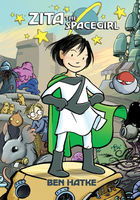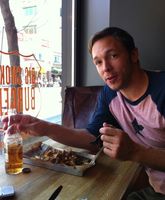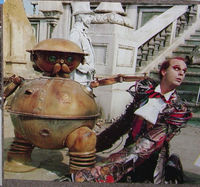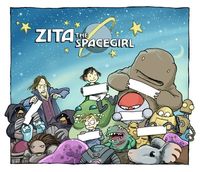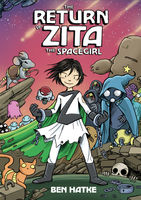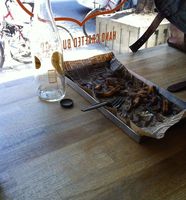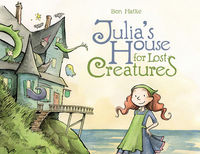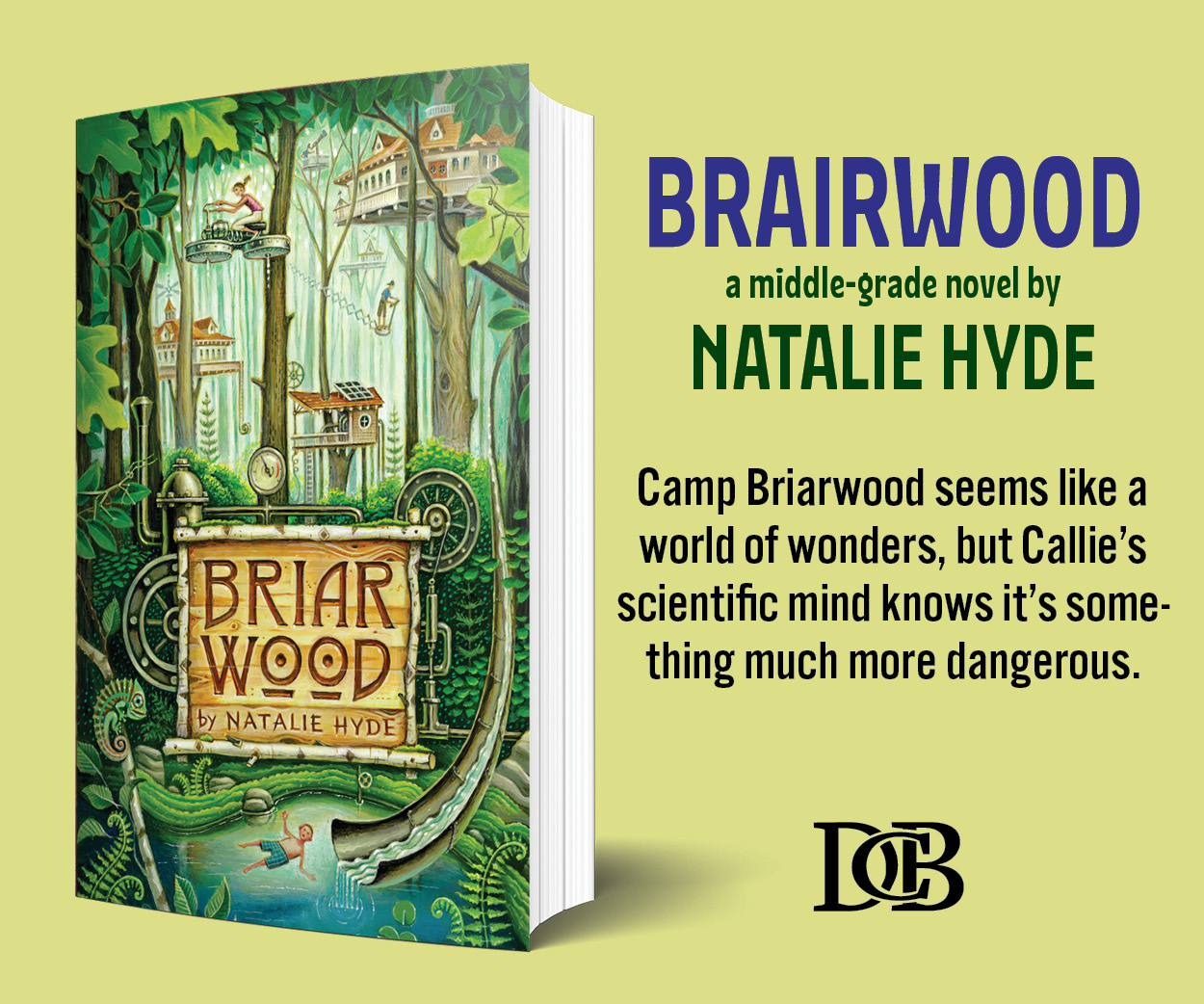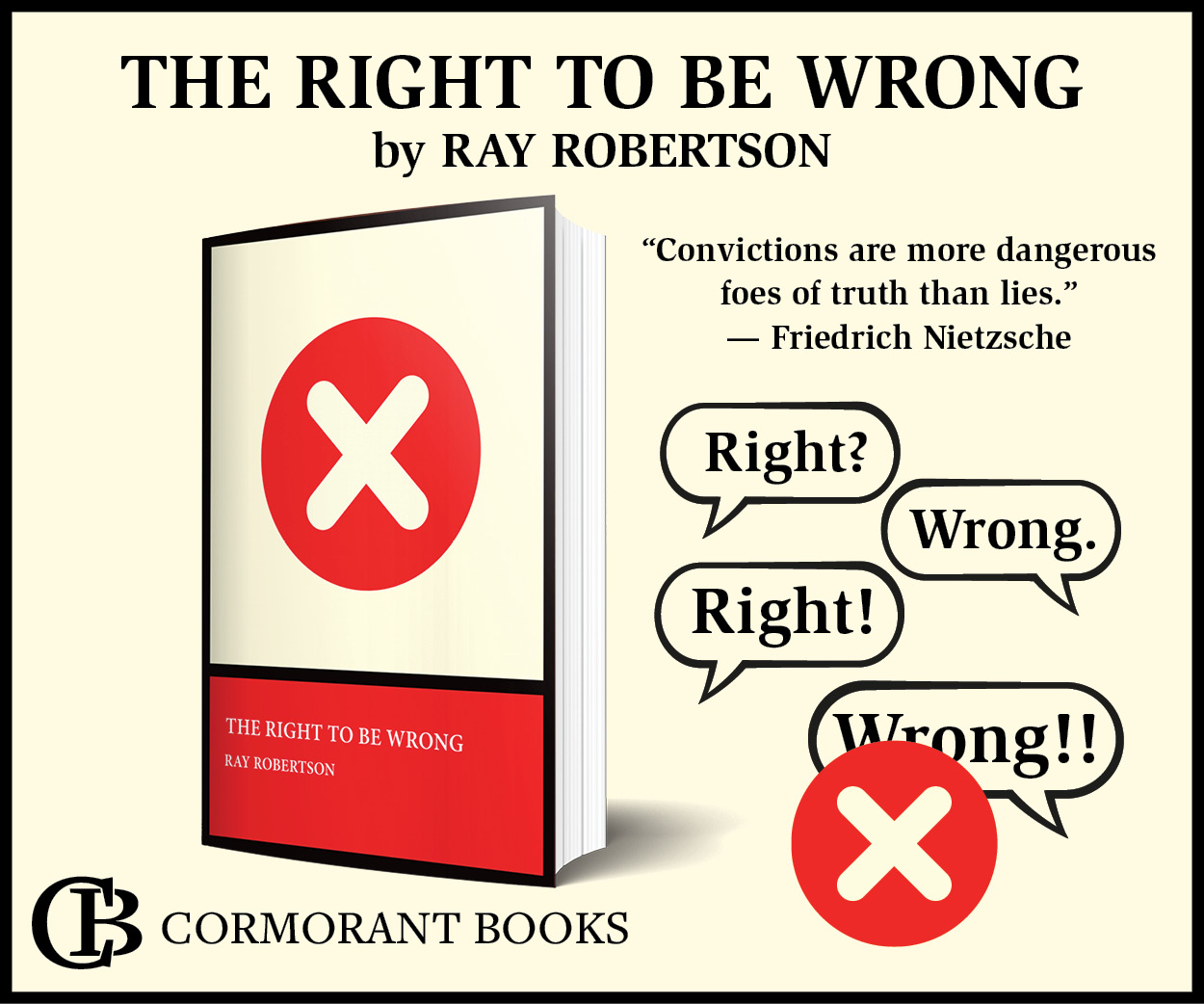Words & Curds: Ben Hatke, Creator of Zita the Spacegirl
By Evan Munday
On May 11, I whisked comics creator Ben Hatke (Zita the Spacegirl, Flight) away from the Toronto Comics Arts Festival to enjoy some poutine and undergo an interrogation. The American writer and illustrator has just released the third (and final) Zita adventure, Return of Zita the Spacegirl, with First Second Books. We visited Big Smoke Burger, just across the road from the Toronto Reference Library, where TCAF was taking place. We both ordered a traditional poutine, and both – in an unusual turn of events – finished our poutines. (Or close enough.) I don't want to infer too much, but I think he was kind of excited that a poutine lunch was part of his Canadian itinerary. Over our lunch, we talked about the terrifying Wheelers in Return to Oz, the importance of costume design, and scrapple.
About Zita, the Spacegirl: (adapted from the First Second site): When her best friend is abducted by an alien doomsday cult, Zita leaps to the rescue and finds herself a stranger on a strange planet. Horse-sized mice and living cannons are strange enough as new experiences go, but Zita is even more surprised to find herself taking on the role of intergalactic hero. Before long, aliens in all shapes and sizes don't even phase her.
EVAN: Were you a fan of The Wizard of Oz? I feel like the first Zita book, more than the others, has a lot of secret nods to it. There's the ruby gateway. She's woken up by all her friends at the end, just like in The Wizard of Oz. She gathers loyal friends along the way. Were you attempting to make a sort of space Wizard of Oz? With the first book, at least?
BEN: Yeah, a little bit. The Wizard of Oz thing that hit me the most strongly was that Return to Oz movie. The Disney one. Which was so creepy and wonderful –
EVAN: – and terrifying! –
BEN: – and the Wheelers scene just lives on as part of me. (Laughs.) And there are elements of The Wizard of Oz, but I think when I was trying to make the transition from web comic with no explanation as to why this girl is traveling around – the web comic mostly focused on things like, 'Look, I'm in a weird grocery store,' or two weird personalities clashing, just really simple ideas – I was reading a lot of folk tales at the time, putting a lot of fairy tale logic into things. And one of the common threads of that is, if you move through the other world, your actions have these consequences. And acts of kindness gain you these people who will assist you. Another was Labyrinth. As she goes into the goblin kingdom. And she helps Ludo. Ludo becomes her ally. And she helps that little fox guy, and all these guys – and Hoggle! He can't betray her, you know? And I like that kind of storyline and kind of stories. But yes. I haven't read the original Wizard of Oz as many times as other things, but that follows a typical story structure for that kind of quest.
EVAN: That's funny, because I was going to say Zita's strength often comes form her kindness or compassion toward these strangers. And she's able to win the loyalty of these misfits she meets.
BEN: And that kind of becomes a through-line for the three books, even though as a storyteller, I'm trying to rev up the storytelling and learn. So the first one, I was trying to go for classical story structure. And then, the second and third ones are a little bit more – the second one, in particular, is a little more meandering and not straight-up structured. (Gestures a straight line with his arm.) It deals with tangential issues, different things … Oh! (Poutines arrive.)
EVAN: Thanks a lot. (Gestures to Ben.) These are the smalls.
BEN: I chose wisely.
Your CanLit News
Subscribe to Open Book’s newsletter to get local book events, literary content, writing tips, and more in your inbox
EVAN: (Laughs.) Was it always in your mind to make one of Zita's primary characteristics – there are other things, obviously, like her curiosity – but her compassion was the one thing that struck me compared to some other comic heroines.
BEN: Right. You could say her superpower is winning friends who have superpowers.
EVAN: She's kind of like Rick Jones.
BEN: Right, yeah. (Laughs, unfazed by Evan's super-nerdy reference.) She's probably a fairly athletic ten-year-old, eleven-year-old girl, but then, you know, if your devoted friend is a robot with a cannon, like, okay, you're doing a little bit better. You know? Level up! I guess that was a thing I kept coming back to. And she's not universally nice. I think of her as a real kid at this point. So she has impulse control problems and she has a sense of justice that when it gets trod upon, she gets really super-angry super-quick.
EVAN: I'll let you start eating. Sorry.
BEN: Words and Curds.
EVAN: It's better when it's hot, so you should eat some now. There are references to some of your influences in the book, I think. Correct me if I'm wrong, but P.T. Gilliam, who is the writer of those books on creatures and robots, is he a reference to P.T. Barnum and Terry Gilliam? Or is that totally wrong?
BEN: Barnum, yes. Gilliam, not so much. There was a hardware store called Gilliam's. At the time, I was having a lot of house problems, and they were very good to me. And they were one of these old, small-town mom-and-pop kind of hardware stores. It's gone now. But at the time, they were very helpful.
EVAN: So you wanted to pay them back a bit.
BEN: Yeah. But as you said, Barnum. I mean, that book you mention's a tiny little book that doesn't have much backstory to it, but in my mind, you're supposed to kind of get the sense it's written by a half-huckstery guy. And he doesn't maybe have all of his information right.
EVAN: Yeah. But also, there's Miyazaki –
BEN: – yes. Him. His movies kind of knocked me sideways when I was already in my twenties. Because I didn't find him until then, and then I just got Spirited Away. My wife went to bed and I thought, 'I'm just going to stay up and watch this.' It's late and dark and I was watching this movie, and I had to pause it, just to collect myself because it was like, 'I can't handle how amazing this is.' So, yeah, that was a big deal. But there's also –
EVAN: (Rudely interrupting.) Yeah, what would readers be surprised was an influence on you and these books? That might not be readily apparent?
BEN: There is a part where I reference – one of the creatures in the crowd is wearing a Jayne hat. Or a similar hat to Jayne and he has a belt buckle that says, 'Whedon.' And I did that just specifically because Firefly was great. I don't know if there's any surprising ones. There's a lot of Henson, there's a lot of Elfquest.
EVAN: I think Elfquest would be surprising, because I think Elfquest is a thing that has, unfortunately, fallen of people's radars. I think I read somewhere that you enjoyed the work of the Pinis.
BEN: Mm-hm.
EVAN: I thought Zita's costume seemed instantly iconic. Like, as soon as she put it on, I felt like I'd been reading about this character for years. What was the process of designing Zita?
BEN: Yeah, yeah. There's a little bit about the development of the character in the third book. Have you read that –
EVAN: – oh, I didn't get to that yet. I've only read the first two.
BEN: No, no. I just wanted to make sure I wasn't retelling a boring story. I'd been working with Zita as a character for a long time. It started in college. And the original Zita comics – my wife … okay, I met this girl in college, she was super-cute. And I was making comics just for people to read. And she had these comics she made in high school about this spacegirl. But no look. She was a character and she was from the future. They were her high school comics. So I thought, 'I will impress this girl! I will develop this character. And give her a redesign.' And then I made her a comic of it, and that's when the outfit started to develop. She was totally different. The costume was similar, but the character was different. Older, also. She'd been shrinking and changing ages –
EVAN: So she was sixteen or something like that.
BEN: Yeah. And also, she was like part of some galactic force – it was like a uniform –
EVAN: Like a Green Lantern or something like that?
BEN: Yeah. It was like a Green Lantern uniform. And at some point, we made this costume.
EVAN: Like an actual costume?
BEN: She and her friend sewed one up. It just became this thing. Then, when she made the Zita costume, we added a black cape. It was like the Lantern Corps; it was more uniform-like. I came back to Zita while doing web comics and dropped the cape. It went back and forth between, like, short sleeves and skirt to tunics to different things. But always with the white and the 'Z.' I think it was when the book came around that I finally put on the green cape which sort of seemed to tie it all together. Like, that splash of colour and not … primary … you know? I love costume design anyway. I spend a lot of time redesigning the Justice League.
EVAN: Oh, really? (Laughs.)
BEN: Yeah, and I have strong ideas about this. I'm a real advocate of flipping the red and the blue in the Superman 'S'. Because the red is a dark enough colour on its own that the yellow will pop against the blue. They're both darks. If you squint, blue and red will blend into the same sort of gray. But yellow will pop out a little more. So I'm a big fan of reversing those. So, yes. I think a lot about costumes. Maybe more than I should.
EVAN: No, but I think it pays off.
BEN: And it's a fun thing to do. I very purposely tried to make Zita's costume special. And it's hard – it's hard to find a niche with all that's been done. A new iconic niche. Because there have been so many designs. In the early days, you could take a character with a not very distinct personality. Like Superman, I'm sure, in the Action Comics days, was a mild-mannered reporter and a super-man, but he probably didn't have much nuance to him.
EVAN:Yeah, I think especially in his superhero form, he was just sort of a guy who showed up when trouble happened.
BEN: Sure. 'Here is a hero!' And I feel like in those days, you could really ride on an iconic costume. But now, when there are so many costumes and so many things going on, you need to have both. The iconic look will help a character, but also, an actual personality will help. The costume just pushes an actual personality forward.
EVAN: They complement each other.
BEN: Right.
EVAN: You worked in web comics. And before the Zita books came out, you'd done work for some anthologies, like Flight. In terms of your process or writing, how different is it doing one of those shorter pieces to doing a 200-page comic?
BEN: Super-hard. Super-different, super-hard. It's like going from writing a short story to writing a book. There are different challenges to both. And I'm not sure I was ever great at doing a short story. I look back at my Flight work and I was a lot greener, so that's part of it. But I think that length of story is difficult to make satisfying. You have to really make it a perfect arc in a small space. But telling a long story – like a really satisfying, strong story … I ended up reading books on story structure. The art is a thing that I'm very confident about. But I identify myself as a writer right now. Because that's where my learning is right now. And I'm reading Stephen King's On Writing and Robert McKee and just thinking about the structure of story – the flow and the beats – but spread out over 240 pages or whatever it is. And I think of it a lot as a performance.
Some people, as you know, are like, 'I write for myself.' But I'm really writing for people to read, and I'm trying to guide them through an experience I want them to have. Very much like if you're doing a show. You're guiding your audience through this … this range of emotions that you want to show them. I'm rambling here, but I think a lot about story ideas. It was super-challenging to go to the – I wasn't ready. I was really lucky to propose this book to them [First Second] at a time when a lot of people were signing up middle-grade graphic novels. Easy to get in … or easier. I actually don't have an idea how easy it is. But I felt like I kind of drifted in, and they were like, 'Okay. Let's go. Go for it!' Then I was like, 'Oh crap. I don't know what I'm doing!'
EVAN: I'm in over my head.
BEN: Yes, yes. And I was glad to have that bridge burn behind me, because otherwise, I would have been like, 'This is too hard. I quit.' The cynical side of me thinks that I would have quit. I don't know what would have happened. But it was nice to be like, 'There's no turning back. I have to see this through.'
EVAN: I like that you talk about performance. I was going to ask if you were a big music fan or performer, because a lot of the characters' names reference music. Madrigal and Pizzicato and Glissando …
BEN: Yeah. I'm kind of like a circus boy. That's a little bit of a side interest that I've always had.
EVAN: You fire-breathe, as well, right?
BEN: My wife and I, for a little while – I mean, I'm don't want to make this out to sound like years and years, passing the hat around, doing shows on the streets of the world – but we did children's shows at festivals. And those were good times. I was talking to Chris [Butcher of TCAF] last night. I grew up in Indiana and I'm kind of sporty, but in the way in which I was like … Everybody in Indiana, you have to play basketball. But I was, like, the kid on the unicycle. And I picked up different things: started to juggle, started the double-torches. And then my wife was into it, too, so we'd steal back and forth. I'm not a good juggler, but I did gymnastics all my life. Since I was seven. And it all sort of came together with fire-breathing, and then our shows always ended with fire-breathing onto this hoop that catches fire, and then doing these jumps through it. We have a real love for – we were talking about P.T. Barnum – I like the seedy, yet talented blend of these things. So, yes, there's a conscious background of performing in these books.
EVAN: A lot of the characters in it, too, are kind of like space Barnums or travelling space sideshows.
BEN: And they're also kind of purposely at the edges of society. They're not like a successful space pirate or something. They're people who are trying to hang in there.
EVAN: Make it week to week.
BEN: Yeah, and I think that's another thing from Firefly that talked to me. Here we are in a totally different environment, and they have not just these dramatic problems, but also, 'We need gas.' Or 'we need a job.' I was like, this is the freelancer's life!
EVAN: I agree with that. I look back to movies when I was a kid, and I'm kind of disappointed now that everyone is so successful at what they do in movies and on TV. Like, even in Ghostbusters, these are working-class guys trying to afford, like, Chinese food.
BEN: Yeah. I love that! And it's fun to see Tony Stark build the Iron Man suit, but on the other hand, the Ghostbusters are like, 'We got kicked out of the university. Let's try to start a small business. Is it going to work? I don't know.' I like that.
EVAN: Do you think your work, when you were doing those performances, did that kind of inform your writing? Especially since you're writing for a younger audience? Did that teach you things about writing?
BEN: It taught me about jokes. Later today, I'm doing a workshop on gesture – getting strong gesture in comics. And that performance work taught me a lot about it. One of my goals is to tell or show much story as I can through the body language of the characters. Really try to get as much information – emotional information, story information – as I can through their body language. Through their motions. And actually get a sense of motion in there. And so, these performances, actually being in front of kids, teaches you about comic timing, it teaches you about what you're expressing with your body – whether your character is really aggressive or shrinking away.
EVAN: Kind of like silent movie acting.
BEN: Yeah, and the difference between 'obnoxious proud' and 'funny proud.' There are characters that are so pompous, but it's hilarious. And then there are characters who are pompous because they're villains. And it can be just the difference between their shoulders. I'm really trying to catch that visually. The book I'm working on right now, I'm taking that even further. It's about a little girl who meets a robot and kind of becomes responsible for it. She's like six. It's also for very early readers, so it's a bit spare on the dialogue.
EVAN: I think that's always the mark of a really great storyteller in comics. Can I tell exactly what's going on without reading any of the word balloons or captions.
BEN: There was a scene in the first Zita when she forces Joseph to push that button, and he gets taken away, and her reaction to that. But that scene used to have a lot of dialogue in it. Even some of her talking to herself, her questioning thing aloud. And then the more I took away from that, the stronger it got. Until it was basically nothing.
EVAN: This fall, your first picture book is coming out, Julia's House for Lost Creatures. What made you think this idea was better for both younger readers and a different format?
BEN: I signed up a picture book with them [First Second]. I was working with a couple different ideas. Julia's House, at the same time, I was working on as a graphic novel. And then, just over the course of editorial discussions, Julia's House made a sideways step over to be the picture book. It was stronger as a picture book. I don't know. I'll be interested to see what people think of it. I have small kids and the format has always been really important to me. One of my favourite books of all time is Where the Wild Things Are. I think it's just a perfect work. Julia's House was always for younger readers, but it made a sidestep from a graphic novel, and that's when it really came alive. When I was doing earlier versions, I thought, 'Oh. This is a picture book.' It's weird. Different stories are just different.
EVAN: It's just the way it feels?
BEN: Yeah. And that's mysterious to me. Sometimes you write something and you know it's a graphic novel, and then you write another thing and you know, 'Oh, that's a chapter book. That's a prose book.'
EVAN: Is this your first time trying poutine?
BEN: (Laughs.) Yes, it is.
EVAN: How is it?
BEN: It's actually really good. Much better than I expected.
EVAN: You live in Virginia's Shenandoah Valley.
BEN: Yep.
EVAN: Is there anything local? Like a local delicacy that could be compared to poutine? Like, poutine is particularly Canadian.
BEN: Right. Nothing. Nothing good.
EVAN: Anything bad?
BEN: We have something called 'scrapple.' You know about scrapple?
EVAN: Isn't it a … pig … thing?
BEN: It's like a greasy bowl of hammy pig-type stuff. I haven't had it for years. Not since I was in college. But it's very Virginia-style. But poutine's much better than that.
EVAN: With the second book, it seems to be her learning about responsibility. After what happened in the first book, she has responsibilities for certain people and things. Is the idea, through the series, that Zita is learning a bit about growing up as they go on?
BEN: One of the conscious things that I've been trying to get into her journey is the pull between your home and your friends, which kind of starts at that age. And I think that lasts for a while. All of a sudden there's this outside world with friends and sometimes you go away and you're farther apart. You might sometimes have to choose. But this is written with a lot more distance involved. So she's on this quest to get home, but … does she really want to? And the longer it takes, how different will she be when she does get home? The longer you're away from it, the more different you are when you return to it. You can't go back. At the end of the third book, there's some kind of resolution to that.
EVAN: Do we – sorry, I haven't read the third book – but do we ever see her parents? Because they don't show up int he first two.
BEN: They remain off-screen.
EVAN: I think that's an interesting choice, and sort of aligns her with a lot of other folk tales where parents are always out of the picture.
BEN: A little bit. Also, we hadn't seen them at the beginning. And in the second one, she does dream a bit about her house. We see a glimpse of it. But some things you really want people to fill in. And in the third one [SPOILER ALERT], she does go home, but not voluntarily. In the end, it's the only way out of the situation. It's a really mixed bag.
EVAN: Bittersweet.
BEN: Yeah, and she goes into her house, but her parents remain off-screen. Then, we actually meet her a year later, and it's kind of good and kind of bad. It's just like life.
EVAN: Or poutine.
Poutine Count:
Evan: 6
Authors: 3
The views expressed in the Writer-in-Residence blogs are those held by the authors and do not necessarily reflect the views of Open Book: Toronto.
The views expressed in the Writer-in-Residence blogs are those held by the authors and do not necessarily reflect the views of Open Book.
Evan Munday is the author and illustrator of the acclaimed book series for young readers, The Dead Kid Detective Agency. Both The Dead Kid Detective Agencyand its sequel, Dial M for Morna, were nominated for the Silver Birch Fiction Award.
Evan has worked in book marketing and publicity for ten years, eight of which were as publicist at Coach House Books, and he has since worked as a freelance illustrator and ebook designer.
Find out more about Evan on his website, idontlikemundays.com or follow him on Twitter at @idontlikemunday.
